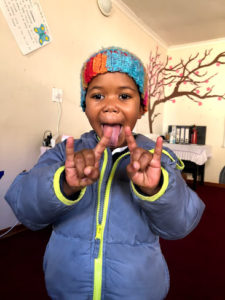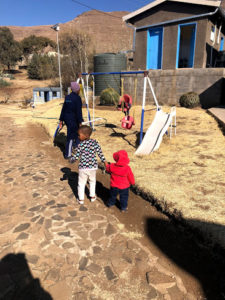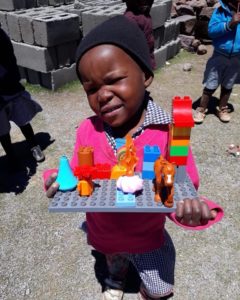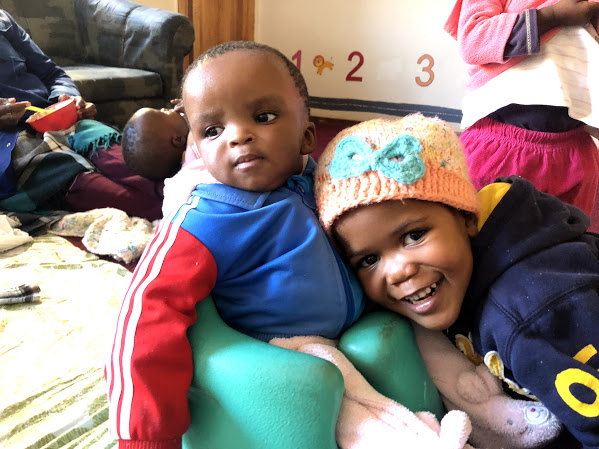It’s not often that we see older children in our safe home, but recently TTL housed a five year old girl. Palesa* and her siblings were temporarily taken in by our staff when their mother had to stay at the hospital with their younger brother. While initially the arrangement served as temporary support for a local mother, staff noticed that Palesa was tall, but very skinny for her age. After conducting a health assessment, it was clear that Palesa was in need of the hands-on care that only our safe home can provide. With nutritious meals and staff constantly monitoring her health, Palesa gained weight steadily. She gained 4kg or about 8lbs after just a month in the safe home!
Unlike the younger kids in the safe home, Palesa had an established vocabulary and was curious about everything. Because she knew very little English and I, very little Sesotho, we had to establish ways of communicating that circumvented the language process. I knew the Sesotho words for “play” and “ball.” She knew the English words for colors and numbers. As we grew bored and found it increasingly difficult to speak with each other, we had to establish new ways of playing thorough nonverbal communication. Her creativity took hold. Instead of passing the ball back and forth we would spin it. Then we would try to bounce it. We created a ramp with our legs and saw how far we were able to roll the ball across the room. One of us would demonstrate a riff on an activity and the other would try to imitate it. We danced, we drummed, we played house, made silly faces at one another – the possibilities seemed endless.

While it may seem that playing ball or house is simply for fun, play aids in child development and is essential to ensure children reach their full potential. Pediatrician Kenneth R. Ginsburg writes, “It is through play that children at a very early age engage and interact in the world around them.” Play improves dexterity and cognitive strength. It fosters creativity and imagination. When play is child-driven, children hone their decision making skills and are able to establish their own interests. Play improves a child’s group skills and allows them an early opportunity for leadership. The cognitive, emotional, and social skills attained through play serve children in an academic setting and set them up for sound lifelong learning habits. Play is so vital to child development that the United Nations High Commission has recognized it as a human right.

Ginsburg also notes the disparities that can disrupt normal unstructured playtime for children: “This birthright [to play] is challenged by forces including…limited resources available to children living in poverty.” It is apparent that play resources are limited in Lesotho. While toys are available in camptowns, it is much harder to find toys for sale in the rural villages that make up the majority of Mokhotlong’s population. With caregivers already stretched to provide the most basic resources for their families, toys are often a superfluous cost. Despite this, children find a way to play using what is readily available to them. Household items supplement traditional toys. Plastic bags become parachutes, wire is twisted into toy cars, bags of rice or beans become maracas.
Play is essential to TTL’s holistic approach. While our criteria for enrollment into TTL programs is centered on physical growth, we take care to see that the children in our services make strides in their mental and emotional development. We want to see them grow as people. TTL not only provides ample resources and playtime to the children in our safe home, but also works to bring play resources to the community, working with local preschools. TTL supplies toys and educational games to ECD schools. Like all children, the preschoolers are overjoyed when new supplies are delivered to their school! And like Palesa, our preschool students have vast imaginations! They build whole worlds out of Legos, create stories for their dolls, and increasingly show us new ways of play with each visit.

The needs of a child go beyond the physical. Health and wellness go beyond the physical. TTL wants for every child to reach their full potential, not just physically, but mentally and emotionally. Palesa was the perfect example of this. Several toys helped her learn about her colors. Sitting at a toy piano we learned the tonal scale. Activities like using our legs as a ramp for a ball helped to reinforce early ideas about physics. Moreover, she was having fun, she took joy in her play, and sometimes that’s simply the most important thing for a child.
Read Ginsburg’s full article here: https://pediatrics.aappublications.org/content/119/1/182.full
*name changed to protect privacy
Lumela, hello! My name is Annie Fort and I am the current fellow for the Touching Tiny Lives Foundation. I graduated with a degree in sociology from Wittenberg University. As a student at Wittenberg, I worked with the Lesotho Nutrition Initiative, a non-profit that packs and ships meals to organizations all over Lesotho, including TTL! Through my experience at Wittenberg and in my current position at TTL, I have learned about Lesotho’s history and the complex issues the nation faces today. I am honored to work with TTL and cannot wait to see what this year brings!


2 Comments
Michael
Aug, 19, 2019Great work Annie and TTL STAFF
Susie Rogers
Aug, 19, 2019Incredible article, Annie. We tend to forget this as we shove academics and sitting still further and further down as requirements for younger children to “succeed” in school. Refreshing to see recognition for the importance of play.